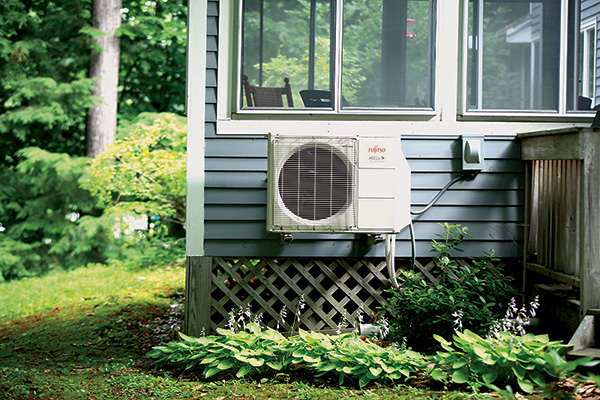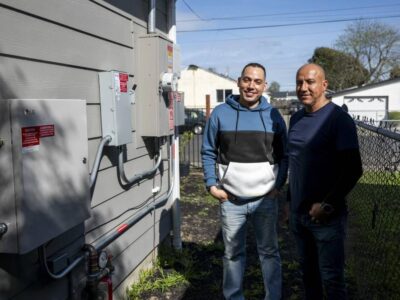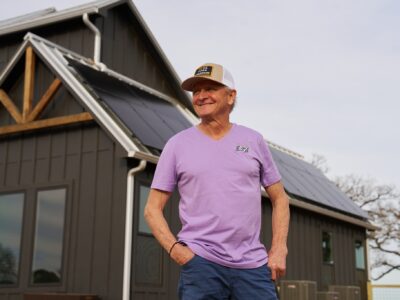(Bloomberg) —
Best known for its scenic lighthouses and fresh lobster, Maine can now make another claim to fame: It’s installing energy-efficient electric heat pumps and heat pump water heaters at a pace unmatched by any other US state.
With a population of 1.4 million people, Maine has over the past decade subsidized the purchase of more than 100,000 heat pumps, which both warm and cool buildings and slash greenhouse gas emissions, especially when powered by clean electricity. About 85% of those heat pumps have been installed in the state’s 570,000 households, with the rest going to commercial properties. Heat pumps are now found in roughly one in five new homes in Maine.
Nationwide, heat pumps outsold fossil fuel furnaces in the first half of 2023. But Maine’s installation rate is three times the US average, according to Rewiring America, a nonprofit that advocates for community electrification. The Pine Tree State has also helped make heat pump water heaters so affordable that the technology accounts for nearly a third of its electric water heaters, according to Efficiency Maine, an independent organization established by the government to implement energy conservation programs. About 60% of new electric water heaters sold in Maine are heat pumps rather than old-style electric resistance models. Nationwide, heat pumps account for only 2% of electric water heater sales.
Maine’s heat pump dominance is its response to an increasingly common climate conundrum: The state has abundant carbon-free electricity on tap — 72% of its electricity came from renewable sources in 2021 — but more than three-quarters of households still burn fossil fuels for heat. It’s a mismatch also familiar to California and Washington, where growing renewable capacity makes electric heating and cooling a logical way to reduce home-energy emissions.
States are also scrambling to devise programs to roll out billions of dollars in heat pump rebates authorized by the Inflation Reduction Act. Though Maine’s population is small, its approach offers a blueprint for other states to follow, according to Rewiring America.
Heat pumps are key to home electrification, as they replace the appliances that are buildings’ biggest emitters of greenhouse gases. They’re up to four times as efficient as gas furnaces, because heat pumps extract warmth from the air to heat a space rather than burning fossil fuels. Heat pump water heaters can also serve as “thermal batteries,” storing water heated by solar and wind energy during the day for use at night when renewable electricity production drops off.
In California, for instance, water heating is one of the biggest consumers of fossil fuels and gas water heaters account for 90% of the market. Swapping them for heat pump versions could reduce greenhouse gas emissions from water heating in the Golden State by as much as 77%, according to a 2021 paper published by the nonprofit New Buildings Institute.
Finding a contractor knowledgeable about heat pumps and willing to install them, though, can be a frustrating and arduous endeavor. So can navigating a maze of rebates and other incentives offered by states and utilities.
A Rewiring America analysis of Efficiency Maine’s heat pump program found that it has overcome those obstacles. “Maine has managed to transform the market so that they have tons of heat pump installers willing to do the work and tons of people choosing to get the work done,” said Joel Rosenberg, program manager for special projects at Rewiring America.
The state also streamlined the subsidy process. Maine residents can obtain an instant $850 rebate on a heat pump water heater at Lowe’s, Home Depot and other retailers. They just scan a QR code on an Efficiency Maine display in the store with their phone and are taken to a website where they provide contact information. They’re immediately emailed a barcode that can be scanned at the cash register to apply the discount. (Alternatively, buyers can mail in a rebate form.)
Efficiency Maine has also worked with big box stores to lower the retail price of heat pump water heaters. That means with the rebate, Mainers pay as little as $429 for a high-tech heat pump water heater, a price equivalent to or cheaper than a less efficient electric resistance water heater. Low-income Maine residents can get a heat pump water heater, installation included, at no cost.
“One of the most successful things we did was to make the purchasing decision seamless and painless for the consumer and the contractor,” said Michael Stoddard, executive director of Efficiency Maine, which is funded by grants, utility ratepayers, a local greenhouse gas initiative and the New England grid operator.
“There’s no reason for the contractor or the customer to choose an alternative to a heat pump as this is a much better product at the same price,” Stoddard added.
To help residents find contractors, Efficiency Maine’s website includes a list of 700 registered heat pump installers, rankable by how many rebates they’ve issued. The organization also provides installers with sales leads gathered from its marketing campaigns and conducts customer-satisfaction surveys after each installation.
“What I love about Efficiency Maine is that they reach out to the frontline folks, those of us who are contractors and are the boots on the ground, to get feedback on the program and what’s working,” said Bethany Tucker, president of family-owned Valley Home Services, one of the installers on the list. Valley Home gives rebates upfront to customers and is reimbursed by Efficiency Maine.
“Clients don’t have to come up with nearly as much money, which definitely helps sell systems,” Tucker said. “It allows us to get sales volume up and certainly more people are able to have a more efficient, affordable way to heat their homes in the winter, and cool them in the summer.”
Efficiency Maine tailored its heat pump program to the state’s housing stock. About 70% of Maine homes rely on boilers that burn oil or another fuel to heat water that’s sent through pipes to radiators. Given Maine’s frigid winters, the program initially focused on heat pumps that would provide supplementary heating by providing rebates for the installation of so-called mini-split systems, which distribute warm air through wall units.
But with technological improvements that allow heat pumps to operate in extremely cold conditions, Efficiency Maine is now promoting “whole home” setups. Combined with a federal tax credit, state rebates drop the installed cost of a $13,800 heat pump system to $4,060 for low-income residents, $5,800 for moderate-income earners and $7,800 for all other residents.
The IRA limits the most generous rebates for heat pumps to low-and-moderate income households, which presents another challenge for states that must develop programs to verify residents’ earnings. In Maine, various state agencies maintain databases of residents who have qualified for other low-income programs, which Efficiency Maine taps to verify eligibility for rebates. Moderate-income residents must submit copies of their tax returns.
“The way Maine has successfully transformed the heat pump market as well as the heat pump water heater market is certainly replicable in other states,” says Rosenberg of Rewiring America.
To contact the author of this story:
Todd Woody in San Francisco at twoody4@bloomberg.net
© 2023 Bloomberg L.P.





